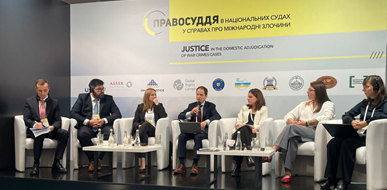Fair trials key to lasting justice
Published 20 November 2023
“Ukraine’s legacy, how this country will be remembered in history, is at stake. And it will be determined by all of you and your commitment to long-lasting justice, not just quick convictions”, said senior researcher Christophe Paulussen (Asser Instituut) during the international conference ‘Justice in the domestic adjudication of war crimes cases’, organised by the U.S. Agency for International Development (USAID) in cooperation with international and Ukrainian partners.
On behalf of the T.M.C. Asser Instituut, which helped facilitate the conference on 19 -22 October in Lviv, Ukraine, Christophe Paulussen gave a presentation on the importance of fair trials in international crimes cases in Ukraine, addressing an audience of Ukrainian criminal justice professionals, MPs, staff members of CSOs and representatives of European and international organisations.
Paulussen made his comments during a panel that discussed ways to raise public awareness about the importance of the right to counsel and fair trial in international crimes cases. The panel also discussed how to best work with the media to build public trust in the courts and confidence in the judiciary's impartiality and transparency when adjudicating international crimes.
Fair trial indicators
During the discussion, Paulussen introduced the ‘fair trial indicators’, a tool that helps court monitors, such as journalists and civil society organizations, assess the fairness of international crimes cases in Ukraine. The fair trial indicators are a product of the MATRA-Ukraine project, co-implemented by the T. M.C. Asser Instituut and Global Rights Compliance (GRC) and funded by the Netherlands Ministry of Foreign Affairs. The project, which started in 2020, helps Ukrainian investigators, prosecutors, judges, and other Ukrainian actors improve their ability to handle international crimes. The project team works with both criminal justice professionals and those who need to monitor the proceedings critically, such as civil society organisations, defence lawyers, and journalists.
Ukraine’s legacy
In his speech, Paulussen focused on the impartiality of Ukrainian courts and stressed the importance of international (human rights) law. He noted: “All Ukrainians are victims of the ongoing armed conflict. And the judges are not excluded from this group either of course: they suffer as well. But how can one apply justice in an impartial manner when you yourself are affected by the war, when you may know people who have died or whose houses have been destroyed, and when the public will put pressure on you to deliver harsh sentences and not pay too much attention to the human rights of Russian suspects or people collaborating with the Russians?” Paulussen observed that this will be a huge challenge but that it must be overcome. Not only because Ukraine has committed itself to international law, but also because, as several conference participants indicated, Ukraine is different from Russia.
Paulussen: “We will want to read in the history books 50 years from now, that Ukraine, even though it became the victim of a war of aggression and countless violations of IHL and international human rights law, was victorious, not only militarily, but also legally and morally. This long-term goal must be kept in mind. Ruby [Axelson] already mentioned yesterday the importance of taking a sustainable approach. Of course, it’s difficult to keep focused while you have this ‘avalanche’ of cases to deal with, but Ukraine’s legacy, how this country will be remembered in history, is at stake. And it will be determined by all of you, and your commitment to long-lasting justice, not just quick convictions.”
Extraordinary burden
Paulussen urged international partners to do everything they can to relieve the Ukrainian criminal justice actors from their extraordinary burden. “We should not only assist them in strengthening their knowledge and capacity in the fields of IHL, ICL and international human rights law, but we should also assist in the creation of an environment in which these professionals can actually apply the law.” This environment could be created by educating the general public, through CSOs and journalists, but also through the Ukrainian courts themselves. The courts will have to communicate what their mandates are, including their limitations, what international law is and why it is important to follow it.
Paulussen: “If Ukrainian citizens realise what a fair trial really means and thus accept that this may lead to the conviction of a Ukrainian soldier or the acquittal of a Russian soldier for international crimes, then the chance is also bigger that criminal justice professionals will more readily do what they know deep inside is the right thing. For there will be less backlash towards a rational and legally correct, but unpopular decision.” Paulussen concluded his presentation by expressing support for the Ukrainian criminal justice professionals: “This will be a long and difficult process, but rest assured that we are committed to helping you along the way. And if there is one people that can take on this task, it will be the resilient and brave people of Ukraine.”
The panel consisted of:
- Andriy Potapenko (Judge-Speaker of Rzhyshchiv City Court of Kyiv Oblast, Chair of the Council of Judges’ Committee on Cooperation with Media and other governmental and non-governmental organizations)
- Valeriya Rybak (Director, Human Rights Vector)
- Olga Kobylynska (Executive Director, Media Initiative for Human Rights)
- Antonietta Trapani (Project Coordinator, War Crimes Monitoring Project OSCE Mission to Bosnia and Herzegovina)
- Kateryna Halenko (Country Director Institute for War & Peace Reporting)
- Christophe Paulussen (Senior Researcher Asser Institute, and Project Leader of the MATRA -Ukraine-project
- Moderator was Ghenadie Barba (Chief of Rule of Law Unit, OSCE Office for Democratic Institutions and Human Rights (ODIHR))
Read the full speech.
Watch a video by the Ukrainian public broadcaster Suspilne.

